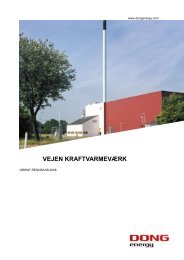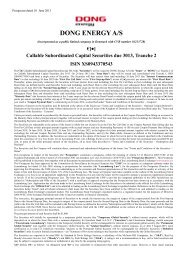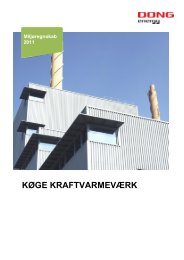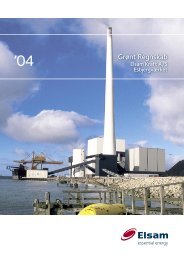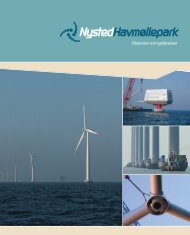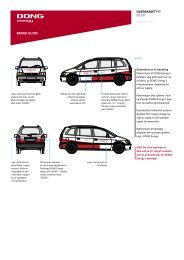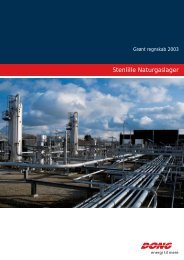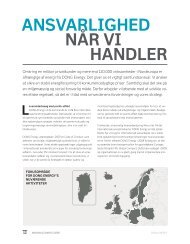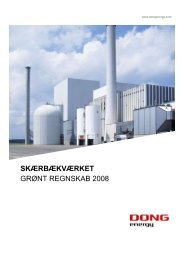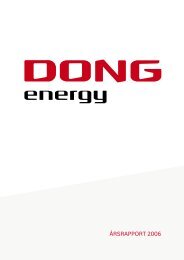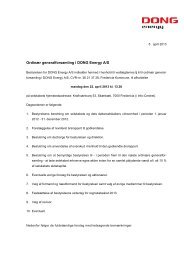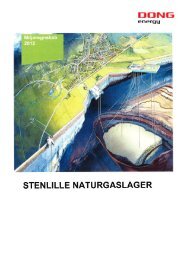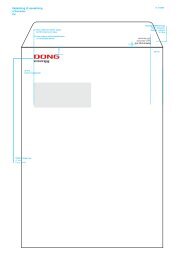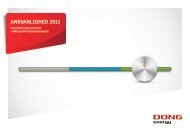ANNUAL REPORT 2011 - DONG Energy
ANNUAL REPORT 2011 - DONG Energy
ANNUAL REPORT 2011 - DONG Energy
Create successful ePaper yourself
Turn your PDF publications into a flip-book with our unique Google optimized e-Paper software.
notes<br />
02 Critical accounting estimates and judgments<br />
international fi nancial reporting standards (IFRS 10 and 11) relating<br />
to consolidation and jointly controlled assets will become<br />
effective from and including 2013. The new standards mean<br />
that the option to apply proportionate consolidation to jointly<br />
controlled entities will cease in some cases. In such cases, profi t<br />
must instead be presented as one aggregate amount, in the<br />
same way as the share of profi t (loss) of associates. In the balance<br />
sheet, assets and liabilities relating to jointly controlled<br />
entities must also be presented as a net amount in future, like<br />
investments in associates. This will mainly affect property, plant<br />
and equipment. The new standards are expected to have a limited<br />
effect on <strong>DONG</strong> <strong>Energy</strong>’s fi nancial statements.<br />
Business combinations<br />
In connection with acquisitions, the Group makes judgements<br />
of the contracts concluded in order to determine whether<br />
the acquiree should be classifi ed as a subsidiary, a jointly<br />
controlled entity or an associate. Such judgements are made<br />
on an acquisition-by-acquisition basis based on purchase<br />
contracts concluded, shareholders’ agreements and similar<br />
03 Segment information<br />
Segmentation<br />
Management has defi ned the Group’s operating segments based<br />
on the reporting regularly presented to the Group Executive<br />
Management, and which forms the basis for management’s<br />
strategic decisions. The Group Executive Management adopts a<br />
product-driven approach to the management of activities, managing<br />
each segment differently from a commercial point of view.<br />
With effect from 1 January <strong>2011</strong>, <strong>DONG</strong> <strong>Energy</strong> has elected to no<br />
longer apply the provisions on cash fl ow hedge accounting for<br />
certain derivative fi nancial instruments, see note 40 in the complete<br />
annual report. Accordingly, IFRS no longer refl ects the way<br />
in which management manages the business, and the Group’s<br />
internal management reporting has therefore been adjusted by<br />
the implementation of business performance results. The comparative<br />
fi gures for 2010 have been restated accordingly.<br />
Adjustments between business performance and IFRS consist<br />
of timing differences relating to movements in the market value<br />
of contracts, including hedging transactions, that are deferred to<br />
the period in which they are to be recognised. The adjustments<br />
column will accumulate to nil over time.<br />
Segment income, segment expense, segment assets and segment<br />
liabilities are those items that, in the internal management<br />
agreements, which determine the extent to which control of<br />
the acquiree has been transferred. The classifi cation is important,<br />
as the recognition of proportionately consolidated jointly<br />
controlled entities has a different effect on the fi nancial statements<br />
than full consolidation of a subsidiary or recognition of<br />
an associate using the equity method.<br />
No business combinations were recognised in 2010 and <strong>2011</strong>.<br />
Transactions with non-controlling interests are accounted for as<br />
transactions with the group of owners. If the acquisition of further<br />
ownership interests in a subsidiary results in a difference between<br />
the purchase price and the carrying amount of the acquired<br />
non-controlling interest, the difference is taken directly to equity.<br />
Gains and losses on disposal of equity investments to non-controlling<br />
interests are also recognised in equity to the extent that<br />
the sale does not result in a loss of control. The determination of<br />
whether a sale results in a loss of control relies on judgements on<br />
a case-by-case basis based on contracts concluded.<br />
reporting, are directly attributable to the individual segment<br />
or can be indirectly allocated to the individual segment on a<br />
reliable basis. Other activities primarily comprise income and<br />
expense, assets and liabilities, investing activities, income taxes,<br />
etc., relating to the Group’s administrative functions and certain<br />
initial stages of research and development that do not relate to<br />
the Group’s primary activities.<br />
The Group operates with two performance measures, with<br />
EBITDA as the primary performance measure and EBIT as the<br />
secondary performance measure. For defi nitions of gross investments,<br />
net working capital and capital employed, reference is<br />
made to the explanations of these terms. Intersegment transactions<br />
are priced on arm’s length terms.<br />
Reportable segments comprise the following products and<br />
services:<br />
72 76 COnsOliDatED finanCial statEmEnts – <strong>DONG</strong> ENERGY GROUP <strong>ANNUAL</strong> <strong>ANNUAL</strong> <strong>REPORT</strong> <strong>REPORT</strong> <strong>2011</strong><br />
<strong>2011</strong><br />
• Exploration & production: Oil and gas exploration and production<br />
in Denmark, Norway, the UK, the Faroe Islands and<br />
Greenland as well as an ownership interest in the Gassled<br />
natural gas pipeline network connecting the Norwegian<br />
fi elds with the European continent and the UK.



